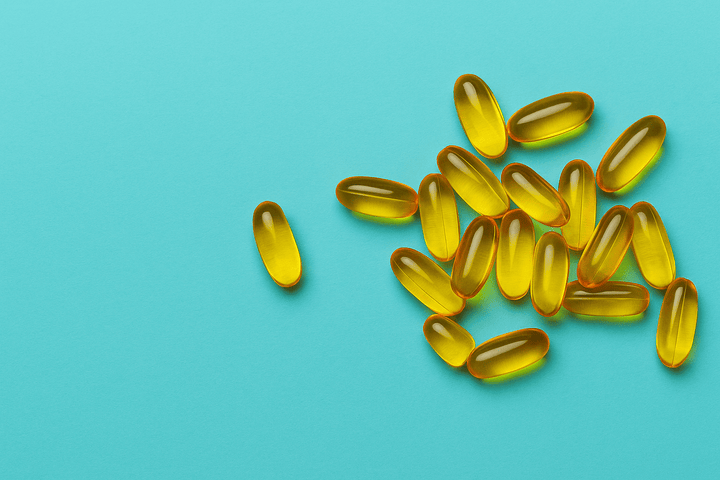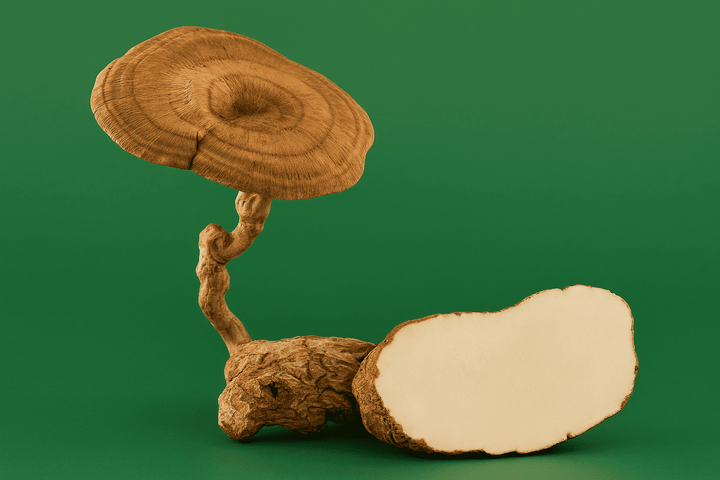Tiger Milk Mushroom (Complete Guide): Benefits, Side Effects
Tiger milk mushroom (TMM) is gaining popularity in Malaysia and beyond for its powerful respiratory and immune-boosting properties. Traditionally used in Southeast Asian medicine, this rare fungus offers scientifically backed benefits ranging from reduced inflammation to enhanced lung function.
In this guide, we’ll explore what tiger milk mushroom is, its proven health benefits, potential side effects, and whether it could be the right supplement for you.
What is Tiger Milk Mushroom?
Tiger milk mushroom (TMM), scientifically known as Lignosus rhinocerus, is a fungus that has been traditionally used for medicinal purposes in South East Asia. Common names for this mushroom include cendawan susu rimau or kulat susu rimau, which translate to "tiger milk mushroom". Historically, the term "tiger milk mushroom" may also have encompassed other species within the Lignosus genus, such as L. tigris and L. cameronensis, due to the similar appearance of their sclerotia.
These mushrooms are found in the tropical rainforests of regions like Malaysia, China, and Thailand. The sclerotium, a tuber-like structure of densely packed fungal mycelium containing nutrient reserves, is the part of the mushroom that is typically used in supplements due to its beneficial properties.
Tiger milk mushroom was also first mentioned in “The Diary of John Evelyn” about 400 years ago and was received as a repository’s collection by the Order at Paris from Jesuits of Japan and China.
Benefits of Tiger Milk Mushroom
Improved Respiratory Health and Pulmonary Function
A clinical study investigated the beneficial effects of TMM supplementation in 50 voluntary participants who took 300 mg of TMM twice daily for three months. Results demonstrated that tiger milk mushroom supplementation significantly (p < 0.05) improved pulmonary function.
Specifically, FEV1 showed a 19.7% improvement (p < 0.01), and the ratio of FEV1 to FVC was also significantly improved (p < 0.001) from 67.40 ± 19.76 to 85.73 ± 13.82, equivalent to a 27.2% improvement. The study concluded that TMM supplementation effectively improves respiratory health.
Reduction in Respiratory Symptoms
Respiratory symptoms, assessed by the Nasal Symptom Questionnaire (NSQ), showed significant (p < 0.001) changes by the end of the three-month study period. The NSQ score decreased from 8.96 ± 4.89 to 2.32 ± 0.79, equivalent to 74.1% of drastic changes.
Likewise, the Visual Analog Scale (VAS) score self-administered by participants also showed a significant reduction (p < 0.001) from 2.54 ± 1.54 to 0.68 ± 0.49. These results suggest that tiger milk mushroom supplementation is effective in improving respiratory symptoms.
Suppression of Pro-inflammatory Cytokines
The clinical study found that supplementation of tiger milk mushroom significantly (p < 0.05) suppressed the level of pro-inflammatory cytokines interleukin 1β (IL-1β) and interleukin 8 (IL-8). The reduction in IL-1β content was 54.9%, and the reduction in IL-8 content was 40.8%. IL-1β and IL-8 are major cytokines involved in the initiation and persistence of inflammation in the airway and lung.
Induction of Immunoglobulin A (IgA)
Tiger milk mushroom supplementation also significantly (p < 0.05) induced the level of immunoglobulin A (IgA). The IgA level increased from 4.83 ± 0.28 ng/mL to 10.26 ± 1.79 ng/mL, reflecting a significant (p < 0.01) improvement in respiratory immunity with the supplementation of tiger milk mushroom. Salivary immunoglobulin A (IgA) is an immunity defence at mucosal surfaces, protecting against pathogens and smaller particles.
Increased Total Antioxidant Capacity and Reduced Oxidative Stress
Results from the clinical study showed that the total antioxidant capacity of participants was significantly increased (p < 0.001) from 0.703 ± 0.321 mmol/L at baseline to 1.188 ± 0.525 mmol/L at the last follow-up visit, equivalent to 68.9% of improvement. The malondialdehyde (MDA) content, an indicator of lipid peroxidation due to oxidative damage, was significantly reduced (p < 0.001) from 1.10 ± 0.87 nmol/L to 0.34 ± 0.18 nmol/L, equivalent to a 68.3% reduction.
Anti-inflammatory Effects
Preclinical studies have also demonstrated the anti-inflammatory effect of the sclerotium of Lignosus rhinocerotis. The clinical study corroborates this by showing a significant reduction in IL-1β and IL-8 levels.
Other Potential Health Benefits
A comprehensive review of TMM mentions various other potential positive health benefits, including anticancer, anti-inflammatory, respiratory function enhancement, antioxidant, anti-aging, neuroprotective, photoprotective, antidiabetic, wound-healing, and anti-HIV properties, among others. The sclerotium extracts of L. tigris have also been shown to be antioxidant and possess superoxide anion scavenging activity.
Side Effects of Tiger Milk Mushroom
A preclinical toxicology study showed that there was no treatment-related sub-acute toxicity following 28 days of oral administration of 1000 mg/kg TMM in rats. The no-observed-adverse-effect-level (NOAEL) dose was higher than 1000 mg/kg. Another sub-acute toxicity study of L. tigris cultivar E sclerotium in Sprague Dawley rats also found no significant adverse effects at oral doses up to 1000 mg/kg daily for 28 days. This study noted that while some statistically significant differences in blood hematological and biochemical parameters were observed, these were not considered treatment-related adverse effects.
Buy Tiger Milk Mushroom in Malaysia Today
Tiger Milk Mushroom has a long history of traditional use for supporting general well-being, particularly for immune and respiratory health. PureMed's Tiger Milk Mushroom Plus combines this potent ingredient with Cordyceps and Ling Zhi in a vegetarian-friendly formulation.
Ready to experience the potential benefits? Explore PureMed's range of naturally-derived supplements in Malaysia for your holistic health journey.
FAQ
Is tiger milk mushroom good for lungs?
The findings from the clinical study suggest that tiger milk mushroom may be beneficial for lung health. The study demonstrated that TMM supplementation effectively improved overall respiratory health and immunity. Specifically, it led to improvements in pulmonary function, a reduction in respiratory symptoms, a decrease in the levels of pro-inflammatory interleukins (IL-1β and IL-8), and an increase in the level of the immune antibody IgA.
Is tiger milk mushroom suitable for kids?
The clinical study discussed in the sources involved adult participants. The sources do not provide specific information regarding the suitability or safety of tiger milk mushroom supplementation for children. Therefore, without further research or consultation with a healthcare professional, it is unclear whether tiger milk mushroom is suitable for kids.
Can you take tiger milk mushroom for sinus issues?
The clinical study assessed respiratory symptoms using the Nasal Symptom Questionnaire (NSQ), which includes items related to sinonasal symptoms. The study found a significant improvement in the NSQ scores after three months of TMM supplementation. This improvement was likely attributed to the anti-inflammatory effects of TMM. While the study suggests a potential benefit for nasal and sinus-related symptoms, further targeted research may be beneficial to specifically confirm these effects.




